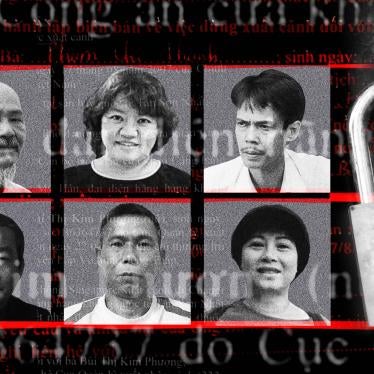(New York) - The editors of two leading Vietnamese newspapers were fired on January 2, 2009, the latest in a series of measures by the Vietnamese government to stifle criticism and dissent, Human Rights Watch said today. In December, the government announced strict new regulations banning internet blogs that disseminate politically sensitive content deemed subversive by the government.
During the last three months, two journalists and one blogger have been tried and convicted on criminal charges. The press credentials of at least four journalists have been revoked after they covered topics such as farmers' protests, relations with China, freedom of expression, and human rights. All media in Vietnam are owned or controlled by the government.
"Vietnam is one of the few countries where people can be locked up on charges of ‘abusing democratic freedoms,'" said Brad Adams, Asia director at Human Rights Watch. "Vietnam's donors should continue to insist that the government stop its criminalization of peaceful expression."
On January 2, Nguyen Cong Khe, editor of Thanh Nien (Young People) and Le Hoang, editor of Tuoi Tre (Youth), were dismissed from their jobs. Their sacking followed the conviction in October of reporters from their newspapers - Nguyen Viet Chien of Thanh Nien and Nguyen Van Hai from Tuoi Tre - for exposing a major corruption scandal, in which government officials pocketed millions of dollars in funds from Japan and the World Bank to gamble on football matches. Chien was sentenced to two years in prison and Hai to two years of "re-education" on charges of "abusing democratic freedoms to infringe upon the interests of the state" under article 258 of Vietnam's penal code.
In an unusual development, both newspapers used their front pages to criticize the two reporters' arrests in May 2008, and the leaders of several journalists' associations in Vietnam also spoke out against the arrests. The deputy editors of both publications were replaced in response, and the critical outcry quickly died down.
"The World Bank and Japan should come to the defense of these investigative reporters and their editors," said Adams. "They should make it clear to the Vietnamese government in public and in private that this kind of retribution for good journalism is not acceptable."
The December regulations on blogs prohibit blogs from disseminating or linking to content that opposes the government, undermines national security and social order, or reveals state secrets. Vietnam's deputy minister of information and communication, Do Quy Doan, has said that blogs should be limited to personal content and refrain from posting articles or opinions regarding politics, religion, and social issues. Do Quy Doan has publicly stated that the ministry intends to solicit the assistance of the internet companies Google and Yahoo to "regulate" and "detect" the content of blogs and websites. Yahoo is part of the Global Network Initiative, which was formed to address issues of corporate responsibility when dealing with censorious governments.
The use of the internet in Vietnam, primarily at inexpensive internet cafes, has skyrocketed during the last decade. Currently there are approximately 20 million internet users (out of a population of 84 million) and more than 1 million blogs, according to government statistics.
"Yahoo 360" is one of the most popular blogging platforms. In May, Yahoo offered a number of services that cater specifically to Vietnamese bloggers, such as a Vietnamese-language search engine and user-friendly links to Vietnamese singers.
The government controls internet use by monitoring online activity, harassing and arresting cyber-dissidents, and blocking websites of democracy and human rights groups, opposition political parties, and independent media based in Vietnam and abroad. Internet service providers and internet cafe owners are required to obtain photo identification from internet users, and to monitor and store information about their online activities.
In December 2008, the Ho Chi Minh City appeals court upheld the 30-month prison sentence of an internet blogger, Nguyen Hoang Hai (or Dieu Cay), founder of the Free Journalists Club in Vietnam. He had posted articles online and participated in rallies protesting China's claims to the disputed Spratley and Paracel Islands. The Vietnamese government considers such activism to complicate its relations with China. Comments on this subject have led to the interrogation and detention of other activists and cyber-dissidents. VietnamNet, an online news source, was fined US$2,000 after it published an editorial on the subject.
In July 2008 a court in Kien Giang Province upheld a five-year prison sentence for Truong Minh Duc, an internet reporter, land rights activist, and Vietnam Populist Party member, for "abusing democratic freedoms."
"The irony of these charges is that there are no ‘democratic freedoms' in Vietnam," said Adams. "The Vietnamese government would do well to allow the media these freedoms."






